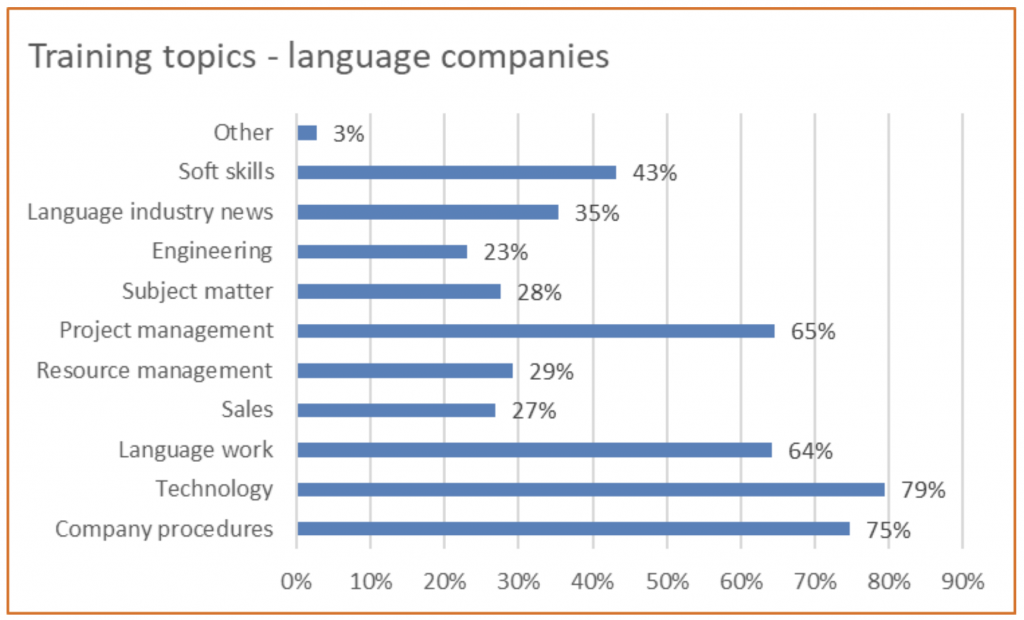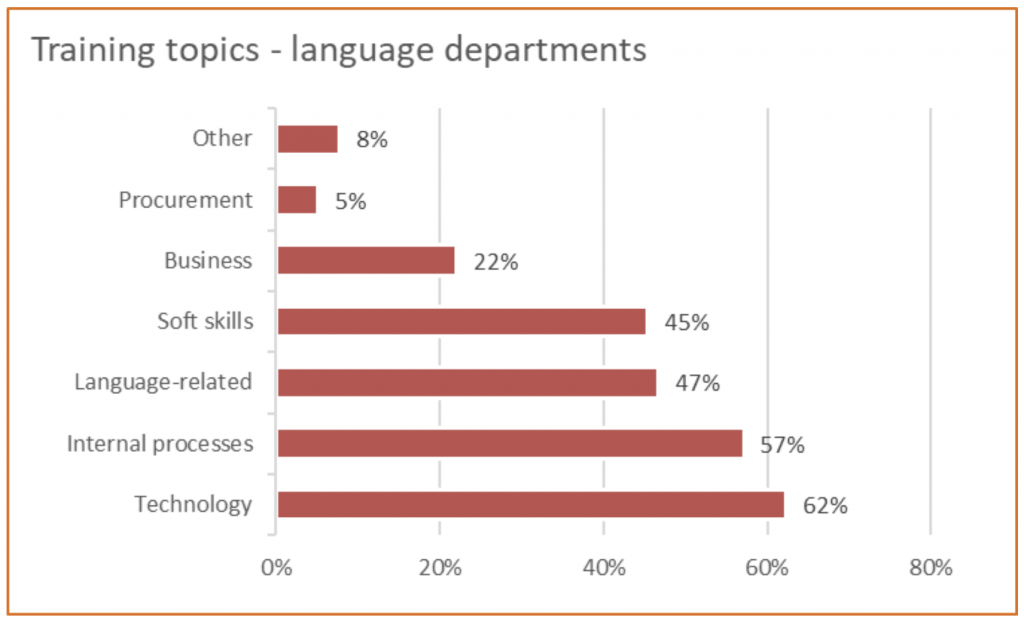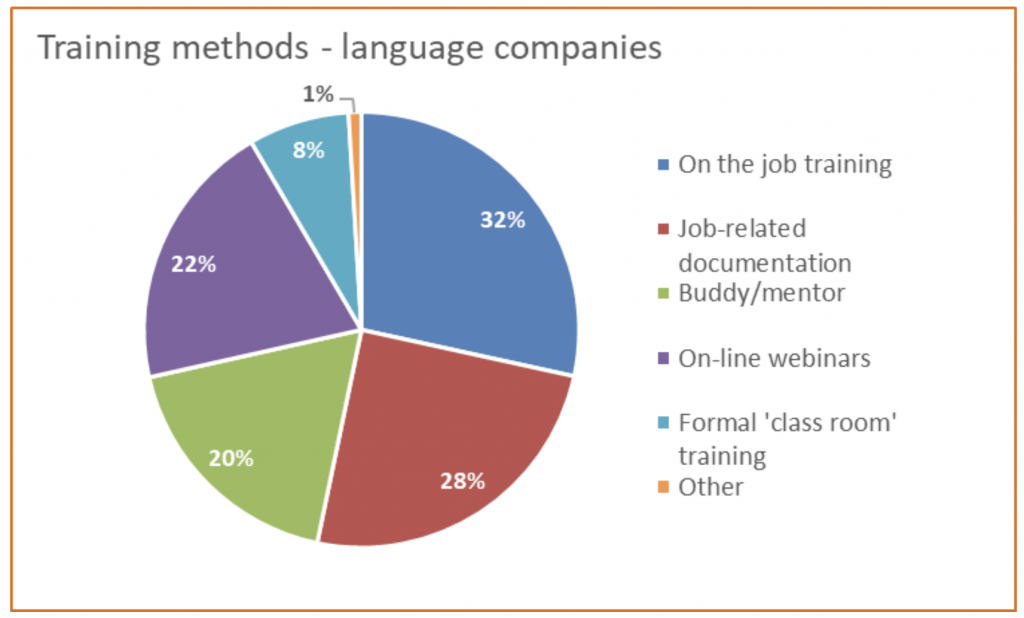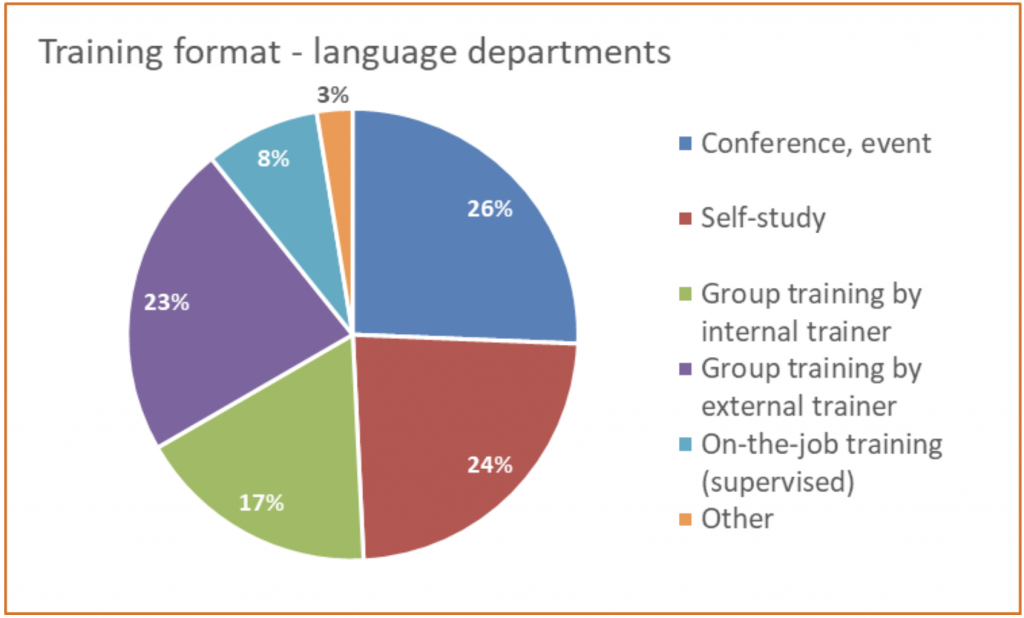Welcome back to our ongoing exploration of the European Language Industry Survey (ELIS) 2024 findings. The ELIS survey covers market trends, expectations and concerns, challenges and obstacles, as well as changes in business practices. As one of the survey’s co-organizers, ELIA is keen to open deeper discussions on these findings across the language services industry and perhaps beyond!
Following our first discussion piece on gender dynamics in LSC leadership, we now turn our attention to training practices within LSCs. In this article, Anu Carnegie-Brown and Stéphane Hue share their insights and thoughts on this topic.
The ELIS survey results showed that training is important for all types of localisation organisations, with an average of 30 hrs of personal development in 2023, that is, an average of 35 minutes per week. The two tables below show that although training both at LSCs and at language departments of the content owner companies covers a variety of subjects, the most important topics are technology and organisation-specific processes and procedures.


Source: ELIS 2024 – European Industry Language Survey: Trends, expectations and concerns of the European language industry
When it comes to who does the training or how the training is delivered, there is a difference. The charts below show that buyer clients train their language department employees by sending them to events and they use external trainers to come in, whereas LSC employees are trained on the job and by their colleagues.


Source: ELIS 2024 – European Industry Language Survey: Trends, expectations and concerns of the European language industry
ACB: Do LSCs lack funds for formal training courses and workshops?
At LSCs, 85% of all staff training happens on the job, by reading job-related documentation or with the help of a colleague. Only very rarely are employees sent out of the company for training, or external trainers brought in. At language departments in the localisation buyer companies, half of all language staff training is provided by external experts. This implies that such training exists and is available, but the LSCs don’t use it.
ACB: Are the job roles and tasks at LSCs so specific that only a colleague can train for them?
The LSC training topics that don’t appear on the buyer company topic list at all include project management, linguistic work, sales and resource management. There are many tasks and roles at an LSC that a language department does not need to cover, so we are not comparing identical entities here.
It’s a fact that project management at an LSC is a different discipline from the project management methodologies outside of our industry, so it makes sense to train project managers internally. Does the same apply also to selling localisation and to managing the localisation supply chain?
SH: Are the LSCs ahead of time being able to rely mostly on on-the-job training and mentoring?
This type of training can deliver better bespoke learning for each employee. In a time of accelerated change, training based on knowledge sharing helps people and organisations adapt faster whereas formal group training requires more planning and might adapt slowly to new requirements, technologies or expectations.
ACB: What events and conferences do the language department staff deem useful for their training?
Every international language industry association and market research organisation in our space offers content and courses for training localisation professionals. They range from free reports and webinars to paid research, consultancy, workshops and elearning courses. It would be interesting to know which ones are used the most and which localisation professionals think are the best value for money.
SH: Do LSCs train enough on subject matter and sales?
The results show that LSCs put less emphasis on these two training topics. Only 28% of them said they have training on subject matters and 27% on sales. Of course, these fields cover 2 very different roles at LSCs:
- For Linguists, subject matter knowledge is becoming ever more critical at a time when they have to deliver ever finer translations or improve machine based content.
- For LSCs’ salespeople and account managers, improving sales skills and the use of technology in sales is also critical when they have to sell new services and competition is increasing, especially from language technology platforms.
SH: How can we measure the outcomes of training?
This was not one of the questions but, when 30 hours are spent on training for each employee each year, I would suggest that the next ELIS Survey asks if such training is enough (or too much) for LSCs employees to adapt to current changes in the industry.
We invite you to share your thoughts on this topic. What do you think about the survey results and are LSC’s doing enough to train their employees? Join the conversation on LinkedIn and let’s discuss! #ELIAdiscussion





